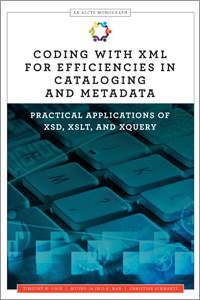
Primary tabs
You don't need to be an ALA Member to purchase from the ALA Store, but you'll be asked to create an online account/profile during checkout to proceed. This Web Account is for both Members and non-Members. Note that your ALA Member discount will be applied at the final step of the checkout process.
If you are Tax-Exempt, please verify that your account is currently set up as exempt before placing your order, as our new fulfillment center will need current documentation. Learn how to verify here.
- Description
- Table of Contents
- About the authors
- Reviews
Even experienced catalogers and copy catalogers who know their way around the tags and strings of a MARC record need guidance when creating metadata for sharing bibliographic records or digital collections on the web. Likewise, coders or new librarians coming from iSchool or software backgrounds need examples of how to use XLML or XSLT scripting with library records. That’s where this new handbook from the Association for Library Collections & Technical Services (ALCTS) comes in. Librarians working in their code editors will want this resource, with its 58 sample coding examples, at their side. It covers
- essential background information, with a quick review of XML basics;
- transforming XML metadata in HTML;
- schema languages and workflows for XML validation;
- an introduction to XPath and XSLT;
- cataloging workflows using XSLT;
- the basics of XQuery, including use cases and XQuery expressions and functions; and
- working with strings and sequences, including regular expressions.
This handbook will help teach catalogers of all levels of experience how to code for efficiencies.
Preface
Acknowledgments
Chapter 1 Introduction
Chapter 2 A Quick Review of XML Basics
Chapter 3 Library Metadata in XML
Chapter 4 XML Validation Using Schemas
Chapter 5 An Introduction to XPath and XSLT
Chapter 6 Cataloging Workflows Using XSLT
Chapter 7 Using XSLT to Connect Libraries to the Semantic Web: Transforming XML Metadata into HTML+RDFa
Chapter 8 An Introduction to XQuery for Library Metadata Work including Use Cases
Chapter 9 XQuery Basics
Chapter 10 XQuery Functions including Regular Expressions
Chapter 11 Metadata Workflow Using XQuery: Creating HathiTrust Submission Files for Monograph and Serials Print Holdings
Chapter 12 Resources for Further Study
Appendix A Sample SPINE Metadata Record for an Emblem Book (discussed in Chapter 7)
Appendix B XSLT for Creating Book-Level HTML+RDFa (discussed in Chapter 7)
Appendix C XSLT for Creating Emblem-Level HTML+RDFa (discussed in Chapter 7)
Appendix D Configurations for Working with XML, XSD, XSLT, and XQuery
About the Authors
Index
Timothy W. Cole
Timothy W. Cole is mathematics librarian and coordinator for library applications in the iSchool’s Center for Informatics Research in Science and Scholarship at the University of Illinois at Urbana-Champaign. He is the coauthor of XML for Catalogers and Metadata Librarians (2013) and Using the Open Archives Initiative Protocol for Metadata Harvesting (2007) and has published widely on metadata, linked open data, and the use of XML in libraries. Cole is a past cochair of the W3C Web Annotation Working Group. A member of the University of Illinois faculty since 1989, Cole has held prior posts in the Library Systems Office and Engineering Library. He is the winner of the 2017 LITA/OCLC Kilgour Award.
Myung-Ja (MJ) K. Han
Myung-Ja (“MJ”) Han is a metadata librarian and associate professor of library administration at the University of Illinois at Urbana-Champaign. Her main responsibilities consist of developing, evaluating, and enhancing cataloging and metadata workflows. Her research interests include the interoperability of metadata, issues on bibliographic control in the digital library environment, and the semantic web and linked data. She has published papers in Library Trends, Library Resources and Technical Services, and the Journal of Library Metadata on metadata quality and bibliographic control.
Christine Schwartz
Christine Schwartz is metadata librarian and XML database administrator at the Princeton Theological Seminary. She has researched and written about cataloging trends and issues on her blog, Cataloging Futures. She contributed an essay, “Changing Mind-set, Changing Skill Set: Transitioning from Cataloger to Metadata Librarian,” to the book Conversations with Catalogers in the 21st Century (2010). Schwartz served on the Code4Lib Journal Editorial Committee in 2008–2009. She has worked with the XQuery programming language for over nine years, specifically working with library metadata programmatically.
Core
The former Association for Library Collections and Technical Services (ALCTS), the Library Information Technology Association (LITA), and the Library Leadership and Management Association (LLAMA) are now Core: Leadership, Infrastructure, Futures, a new division of ALA. Its mission is to cultivate and amplify the collective expertise of library workers in core functions through community building, advocacy, and learning.
"Recommended for the serious, dedicated student of XML and its related technologies."
— Technicalities
"A pragmatic, clear and succinct factual guide ... If you’re looking for a book which demonstrates the power of XML and its application in library work in detail, dive in!"
— Catalogue & Index
"A number of appendixes provide numerous samples and examples of coding along with software configurations. A good book to build efficiencies using metadata in libraries."
— ARBA


